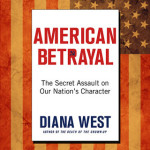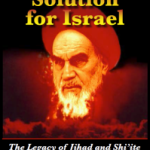By Rachel Ehrenfeld and Alyssa A. Lappen
Washington Times | October 8, 2007
Objections to Borse Dubai’s proposed acquisition of 20 percent of Nasdaq last week prompted Massachusetts Rep. Barney Frank to quip, “In the ports deal, the concern was smuggling something or someone dangerous… What are we talking about here — smuggling someone onto a stock exchange?”
It is not “who” Dubai will smuggle into the stock exchange we should worry about. It’s the arrival of the world’s first Islamic stock exchange exerting unprecedented Islamic influence in the heart of the U.S. and Western economies that should raise our alarm. Dubai’s handsomely paid Washington lobbyists see nothing wrong with that. Rather, they claim the deal benefits U.S. financial markets, giving “Nasdaq access to rich Mideast pockets.” Unfortunately, the deal also increases the appeal and influence of Islamic financing in the West.
What is “Islamic” finance? Islamic, or Shariah-based finance, is the 1920s invention of Muslim Brotherhood founder Hassan al-Banna. He ordered the Muslim Brothers to create an independent Islamic financial system to supercede the Western economy, facilitating the spread of Islam worldwide. He set the theories and practices and his contemporaries and successors developed Shariah-based terminology for “Islamic economics,” finance and banking. Attempts by Muslim Brotherhood members in the early 1930s to establish Islamic banking in India failed. Egyptian President Gamal Abdel-Nasser shut down the second attempt in 1964, after only one year, later arresting and expelling the Muslim Brothers for attempts to kill him. Saudi Arabia welcomed them and adopted their ideas.
In 1969, soon after a mentally deranged Australian Christian fundamentalist, Michael Dennis Rohan, tried to set fire to the Al Aqsa Mosque in Jerusalem, the Saudis convened the Conference for the Islamic Organizations (OIC) to unify the “struggle for Islam,” and have been its major sponsor ever since. The 56 OIC members include Iran, Sudan and Syria.
Based in Jeddah, “pending the liberation of Jerusalem,” the OIC mandates and coordinates actions to “support the Palestinian people, assist them in recovering their rights and liberating their occupied territories.” The OIC’s first international undertaking was the 1975 establishment of the Islamic Development Bank “in accordance with the principles of the Shariah,” marking the beginning of the fast-growing, petrodollar-based Islamic financing market. From 1975 to 2005, the bank approved more than $46 billion in funding to Muslim countries. Since 2000, it has transferred hundreds of millions of dollars raised especially to support the Palestinian intifada and suicide bombers’ families — and has channeled United Nations funds to Hamas. Yet the bank received U.N. observer status in 2007.
Overseeing Shariah finance are the 1991-Bahrain-registered and -based Accounting and Auditing Organization for Islamic Financial Institutions (AAOIFI), which laid the groundwork for the global Islamic financial network and the “de facto Islamic Central Bank”—the Islamic Financial Services Board (IFSB), established in 2002 in Kuala Lumpur “to absorb the 11 September shock and reinforce the stability of Islamic finance.” Chairing the meeting, then-Malaysian Prime Minister Mohamed Mahathir stated: “A universal Islamic banking system is a jihad worth pursuing to abolish this slavery [to the West].”
According to Saleh Kamel, president of the Saudi Dallah Al-Baraka Group and the Islamic Chamber of Commerce and Industry (ICCI), more than 400 Islamic financial institutions currently operate in 75 countries. They now hold more than $800 billion in assets — growing at a rate of 15 percent annually. All investments with Islamic financial institutions are subject to the minimum zakat (Islamic charitable wealth tax).
On April 30, the OIC, the organization that initiated global Muslim riots after the Danish cartoon publications, established the clerical International Commission for Zakat, replacing more than 20,000 organizations that previously collected the money. Islamic clerics’ “expert committee” in Malaysia now supervises and distributes those funds. The new committee will shortly distribute to Muslim charities roughly $2 billion collected during Ramadan.
But not all charities are equal. In 1999, Muslim Brotherhood spiritual leader Yousef al-Qaradawi decreed: “Declaring holy war [and] fighting for such purposes is the way of Allah for which zakat must be spent.” If past zakat distribution is any indication, all Muslim jihadist-terror organizations (including Palestinian Hamas, the al-Aqsa Martyrs’ Brigades, and the many al Qaeda offspring) will benefit.
Shortly after September 11, Osama bin Laden called upon Muslims “to concentrate on hitting the U.S. economy through all possible means. Look for the key pillars of the U.S. economy. Strike the key pillars of the enemy again and again and they will fall as one.”
Most Arab and Muslim states publicly denounced bin Laden. But the impending Nasdaq acquisition, the purchases of over 52 percent of the London Stock Exchange and 47.6 percent of OMX (Nordic exchange) and the vigorous expansion of Shariah financing apparently follow the Muslim Brotherhood-bin Laden script.
President Bush on Sept. 25 at the United Nations called on all nations to open their markets. Surely, he did not mean opening the markets to domination by Shariah.
Rachel Ehrenfeld is director of the American Center of Democracy and a board member at the Committee for the Present Danger. Alyssa A. Lappen is a senior fellow at the American Center of Democracy.
All Articles, Poems & Commentaries Copyright © 1971-2021 Alyssa A. Lappen
All Rights Reserved.
Printing is allowed for personal use only | Commercial usage (For Profit) is a copyright violation and written permission must be granted first.






